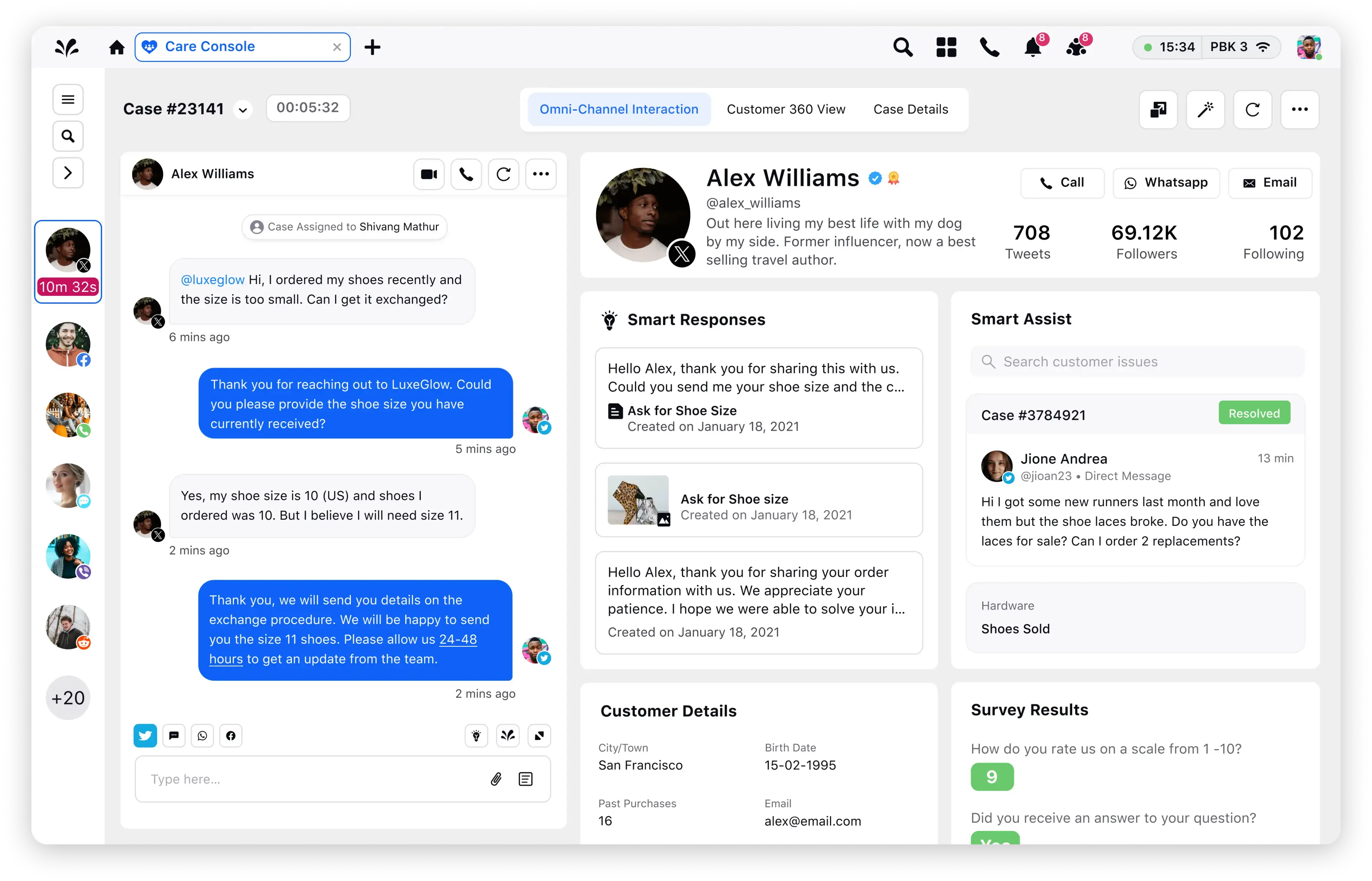The next generation of CCaaS is here
Digital-first customer service, enterprise-scale voice support. Redefine customer service with an AI-powered platform that unifies voice, digital and social channels. Power channel-less interactions and seamless resolution no matter the channel of contact.

Benefits of moving enterprise contact centers to the cloud
The evolution of technology has brought about a significant change in the way businesses operate, and the contact center industry is no exception. In recent years, the trend has shifted towards cloud-based contact centers, and it's not hard to see why.
The cloud-based contact center is rapidly becoming the preferred choice for businesses of all sizes. By leveraging the power of cloud technology, businesses are able to provide a superior customer experience while also streamlining their operations and reducing costs. In this blog, we'll explore some of the key benefits that businesses can enjoy by moving their enterprise contact center to the cloud.
From increased scalability and accessibility to lower costs and improved integration, there are many reasons why so many companies are making the switch. Whether you're a small startup or a large enterprise, a cloud-based contact center can provide you with the tools you need to succeed in today's competitive business landscape. So, if you're ready to take your business to the next level, it's time to consider moving your enterprise contact center to the cloud.
What exactly is cloud computing? How does the cloud work?
Cloud computing is a technology that allows users to access and use computing resources, such as servers, storage, databases, and applications, over the internet. The term "cloud" refers to the delivery of these resources as a service over the internet, rather than as a product that is installed and managed on a local computer or server.
In other words, cloud computing enables users to access computing resources on demand, without having to worry about the underlying infrastructure or maintenance. This means that users can quickly and easily scale up or down their computing resources as needed, without the need to invest in costly hardware or software.
Reasons to move your contact center to the cloud
If you haven't switched to a cloud-based contact center yet, now is the perfect opportunity. Here are just six of the significant advantages you will experience once you make the transition to the cloud.
AI-powered omnichannel experience
Customers nowadays demand the ability to communicate with businesses using their preferred method, with many of them now expecting to connect with brands via social media.
However, many companies still rely on traditional, on-premises contact centers that are limited in their ability to handle omnichannel communication. This means that customers may not be able to reach out to businesses through their preferred channels, leading to frustration and potentially lost business.
To address this issue, businesses should consider implementing a cloud contact center that can support omnichannel communication. By leveraging the power of the cloud, companies can provide a seamless, consistent customer experience across all channels, whether that be email, chat, phone, or social media. Additionally, many cloud contact centers are powered by AI, enabling them to handle a high volume of inquiries while still providing personalized, human-like interactions.
Seamless scalability
Cloud-based contact centers provide increased flexibility, which is one of the main reasons why companies are opting to migrate their contact centers to the cloud. These solutions are highly scalable and customizable to meet the evolving needs of an organization.
With cloud-based solutions, organizations can add or remove agents, add new channels, or change configurations on the fly, without the need for capital expenditures or hardware upgrades. This agility enables companies to respond rapidly to changing market trends and customer needs, allowing them to quickly scale their operations up or down as needed.
Lower costs
Another significant advantage of moving a contact center to the cloud is cost savings. Traditional on-premise contact centers can be expensive to set up and maintain, requiring significant capital expenditures for hardware, software, and infrastructure.
Cloud-based solutions, on the other hand, are typically offered as a subscription service, which eliminates the need for significant upfront investment. This allows organizations to avoid the costs associated with acquiring and maintaining expensive hardware, and instead focus on using the latest technology to enhance their customer service operations.

Reliability
Say goodbye to the hassles of maintaining and managing on-premises infrastructure, including servers, wiring, hardware and physical space. Instead, let your IT staff focus on high-value strategic initiatives that will drive growth for your business.
With a virtual solution, organizations can benefit from the expertise and resources of their cloud provider, which is responsible for maintaining and upgrading the technology. This means that organizations can focus on delivering high-quality customer service, while their cloud provider takes care of the underlying technology.
Additionally, cloud-based solutions are typically designed with redundancy and failover capabilities, which can help ensure that customers are never left without access to support.
Simplified management
The success of your contact center relies heavily on the performance of your agents. By deploying cloud-based contact center solutions, you can simplify call management for them. With the ability to deploy self-service options, such as chatbots, virtual assistants and interactive voice recognition (IVR), your customers can quickly get the answers they need to common questions, complete transactions, check account balances, track shipments and more, without the need to talk to an agent. This reduces wait times and frees up your agents to focus on handling complex customer escalations.
Additionally, a cloud contact center simplifies workforce management, ensuring that the contact center is always adequately staffed. It also offers the added benefit of allowing employees to choose the shifts that work best for them, improving their overall employee experience.
Improved customer experience
Cloud-based contact centers leverage artificial intelligence (AI) and machine learning to improve customer experience. For example, AI-powered chatbots can provide customers with instant answers to simple queries, freeing up agent time for more complex issues. AI can also be used to provide personalized recommendations and support for each customer, creating a more personalized experience.
Furthermore, cloud-based contact centers offer real-time data analytics, enabling businesses to monitor metrics and make data-driven decisions that can significantly improve overall customer satisfaction. By analyzing customer interactions, companies can identify common pain points and communication issues to develop strategies to enhance the customer experience.
Greater security
Finally, cloud-based contact center solutions (such as CCaaS) can also help organizations to meet their compliance and security requirements. Cloud providers typically invest heavily in security and compliance, and offer robust solutions that can help organizations meet a variety of industry and regulatory requirements. Additionally, cloud-based solutions are typically designed to be highly resilient, with backup and disaster recovery capabilities that can help organizations quickly recover from any disruptions.
In conclusion, there are several compelling reasons for organizations to consider moving their contact centers to the cloud. By leveraging the latest technology and taking advantage of the expertise and resources of their cloud provider, organizations can focus on delivering the best possible customer experience, while ensuring that they remain competitive and meet the needs of their customers.

Are you ready for a cloud-based contact center?
Transitioning to a cloud-based contact center can bring your customer service to new heights with advanced and modern solutions. However, with the abundance of options available, selecting the most suitable one for your business can be a challenging task.
It's crucial to thoroughly evaluate the product and the provider's commitment to innovation and support, making sure they align with your company's needs. Determine which applications and workloads are best suited for the cloud, and conduct a proof of concept test beforehand.
Sprinklr's CCaaS solution enriches human interactions by utilizing the scalability of its cloud platform. This allows for a swift shift to remote work models while also providing precise control over operating costs and customer satisfaction.
Our AI analytics tools provide contact centers with valuable insights into customer sentiment, which can be shared across the organization. Customers trust Sprinklr for its comprehensive approach, from seamless implementation to ongoing support, and its ability to fulfill their needs with a superior customer experience.

